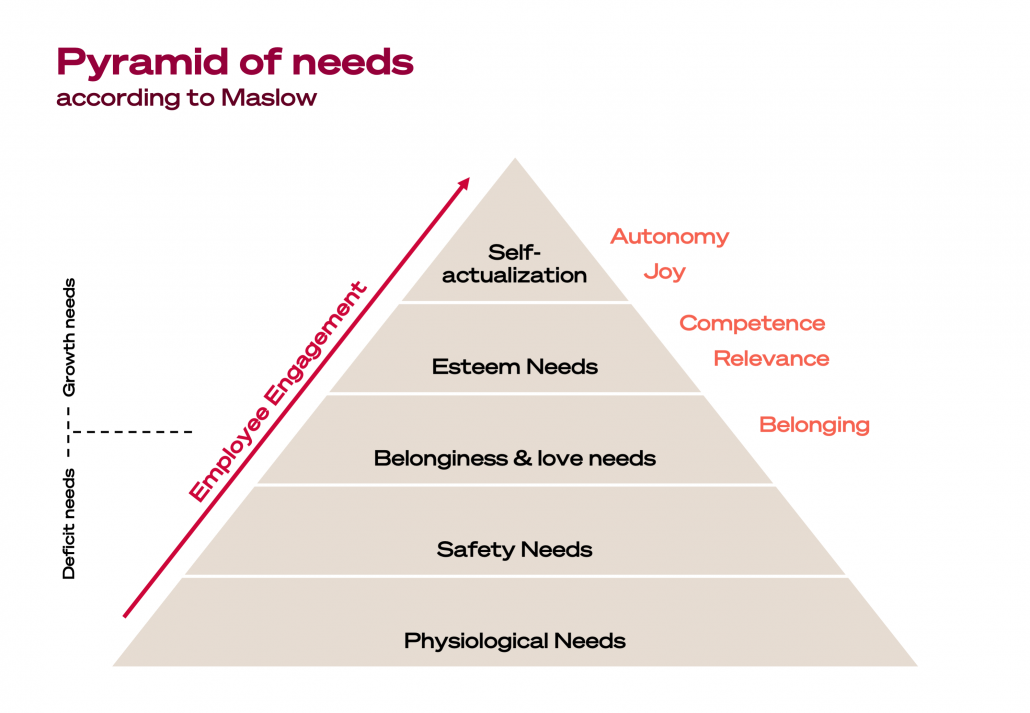Experimentation and learning can be linked to a concept from science, more specifically behavioral science: Through experimentation and learning, basic human needs can be met. In this way, individual change becomes playful, easy and sustainable. Experimenting and learning is an important building block of the digital mindset that makes companies fit for the future.
In today’s fast-paced and complex world, it is critical for people and organizations to continuously evolve and learn to keep pace with changing demands.
Human needs connect with experimentation
Basic human needs are universal requirements that all people share and are essential for a healthy and happy life. Basic human needs theory states that there are five fundamental needs that are essential to human existence and well-being: Autonomy, Competence, Belonging, Meaning, and Joy.
How experimentation and learning meet our basic human needs
Experimentation and learning fulfills our basic human needs by giving us the opportunity to enhance our autonomy, improve our competence, foster our belonging, increase our significance, and experience joy and pleasure. It gives us the freedom to make our own choices and shape our own lives. It allows us to learn new skills and feel competent and capable. Working with others allows us to feel connected and build relationships. It gives us the opportunity to find purpose or meaning in our lives and experience positive emotions and joy.
Request a free call for an “Experimentation & Learning” program for your company

Need for Autonomy
People have a fundamental need for autonomy, i.e. control over their own lives and decisions. When we are able to make our own decisions and determine our own actions, we feel free and independent.
Experimentation and learning allows us to develop and improve our skills and abilities, and gives us the opportunity to make our own decisions and have control over our lives.
Need for Competence
The need for competence refers to people feeling that they are able to cope and succeed. When we feel competent and capable, it increases our self-esteem and sense of well-being.
Through experimentation and learning, we can learn new skills and improve our competence, which gives us a sense of satisfaction and accomplishment. Deliberate playful experimentation creates freedom and removes the pressure of perfectionism.
Need for Belonging
The need for belonging refers to the fact that people have a desire to be part of a group or community. We want to feel connected to others and build relationships.
Experimentation and learning is especially effective when we connect with others in the same organization. Connecting in groups and teams builds a sense of belonging as a first step. This builds confidence to share openly and try new things. The more people in the same organization follow the “experiment and learn” approach, the larger the community becomes.
Need for Meaning
The need for meaning refers to the fact that people have a desire to have a purpose or significance in their lives. We want to feel that we are making a difference and that our lives have meaning.
Experimentation and learning gives us the opportunity to use our talents and skills to accomplish a task or goal that is meaningful to us. This goal may be derived from an overall organizational goal. But it can also be an individual goal. The important thing is that the goals – and thus the experiments – are chosen by the employee.
Need for Joy
The need for joy refers to the fact that people have a desire to experience joy, pleasure and happiness. We want to feel good and experience positive emotions.
Through experimentation and learning, we can have new experiences that bring us joy and give us positive emotions. Connecting with positive emotions in particular is also important for companies. Nothing motivates more than coming to work every day with pleasure and facing tasks in a positive way.
Learn more about the concept of “Experimentation and Learning”.
Experimentation and Learning: Core to a Digital Mindset
Digital mindset is the openness and ability to embrace changes triggered by new technologies and digital transformation. They are perceived as an opportunity rather than a threat. By encouraging their employees to experiment, try out new ideas and learn, companies train new behavior patterns that make them fit for the future. Transformation, overcoming uncertainty, change – with the digital mindset, what was previously tough and difficult becomes easy.
